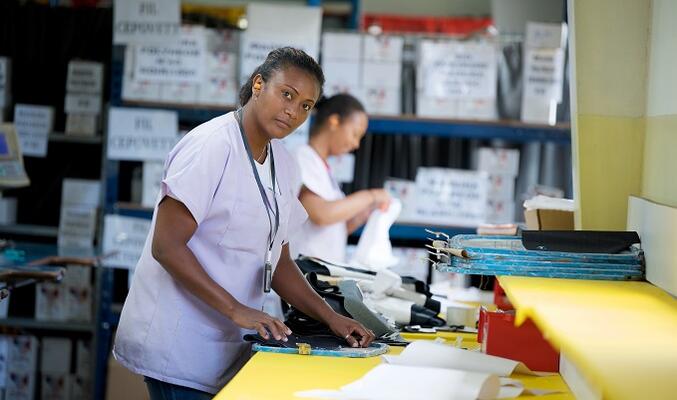
Aid for Trade: A valuable lifeline for small businesses
The International Trade Centre (ITC) led several discussions on small businesses’ needs arising from COVID-19, at the Aid-for-Trade Stocktaking Event held by the World Trade Organization (WTO) from 23 to 25 March.
Partners from member states, international organizations, businesses and other stakeholders, together with ITC experts, looked at the impact of the pandemic and proposed recovery plans focusing on inclusivity, sustainability, digital solutions, trade intelligence, and private sector engagement.
As small businesses account for about 70% of jobs globally, they have a direct impact on livelihoods. Results from ITC’s COVID-19 impact survey show that these businesses are crucial drivers of global efforts to rebuild the economy post-COVID-19, the core message of ITC representatives throughout the event.
“Aid for Trade is development assistance that drives trade-led growth,” said Pamela Coke-Hamilton, Executive Director of ITC. “It is a valuable lifeline for small businesses as it can create the economic conditions and the business ecosystem needed to help them produce and trade more across borders.”
Canada, the European Union (EU) and ITC agreed to explore innovative policies and practical solutions for inclusive and sustainable trade that could bring benefits to marginalized and underrepresented groups while respecting the environment.
Kendal Hembroff, Director General of Global Affairs Canada, underlined that inclusive trade is not only the right thing to do, but also the smart thing to do. “At a time when countries are trying to rebuild from the devastating effects of COVID-19, we have to expand and open trade as much as we can, and key to that is broadening the playing field to support inclusivity,” she said.
João Aguiar Machado, EU Ambassador to the WTO, said: “Going forward, the EU already has a solid Aid for Trade Strategy in place. ‘Solid’ in the sense that it’s principles are as relevant as ever today, with a focus on supporting developing countries make use of their trade agreements and arrangements and preferential access to support their sustainable, inclusive development objectives.”
Switzerland and ITC examined the shift in global trade towards e-commerce since COVID-19 and committed to making trade intelligence more readily available to small businesses. The Global Trade Helpdesk, a one-stop shop for trade information developed by ITC, the WTO, and the United Nations Conference on Trade and Development (UNCTAD), will play an important role in mainstreaming trade intelligence into business decision making.
“Information provided on the Global Trade Helpdesk directly relates to the changing market demands that allow traders to customize products to compete in international markets,” said Monica Rubiolo, Head of Trade Promotion at the State Secretariat for Economic Affairs (SECO) of Switzerland.
Finland, the Netherlands, Kenya, ITC, the African Development Bank, the Institute for European Environmental Policy, and the Finnish Innovation Fund SITRA reviewed the possibilities for Aid for Trade to support countries in implementing national circular economy roadmaps, and mitigating challenges posed by green transition.
The African Development Bank, the United Nations Industrial Development Organization (UNIDO) and ITC explored measures to promote the benefits of the African Continental Free Trade Area (AfCFTA) in the private sector. The key, participants concluded, is to eliminate information gaps – not just in respect of elements of the free trade agreement, but also its implementation and operational modalities, said Alan Kyerematen, Minister of Trade and Industry of Ghana.
A session on the second phase of the Aid for Trade Initiative for Arab States, focusing on inclusive job creation, was organized by the International Islamic Trade Finance Corporation. Ms. Coke-Hamilton recalled ITC’s involvement during its first phase and pledged future support by addressing the skills mismatch, enabling entrepreneurial culture, and facilitating market access and export capacities, with the aim of creating opportunities for youth.
ITC also contributed to sessions on digital solutions and e-commerce by the United States and UNCTAD, on micro, small and medium-sized enterprises by Uruguay, on financing by the LDC Group, and on the informal economy by the Netherlands.
ITC is a 100% Aid-for-Trade institution with the knowledge and experience to encourage entrepreneurship and empower small businesses to integrate into regional and global value chains. Going forward, ITC will work closely with its partners to help small businesses become greener, more inclusive, and more competitive.



